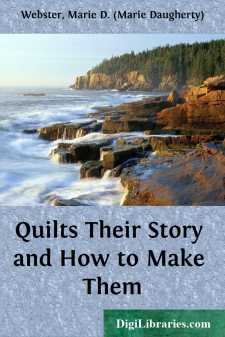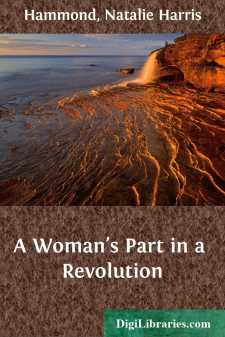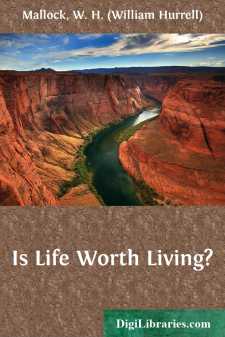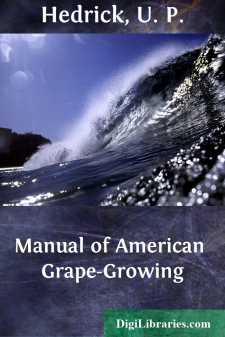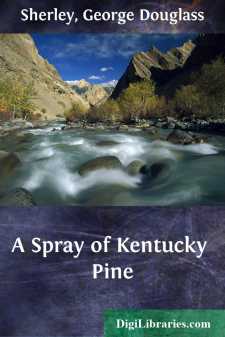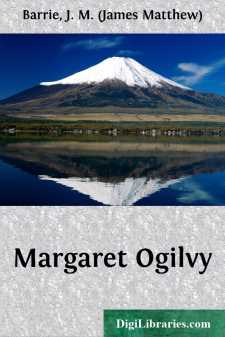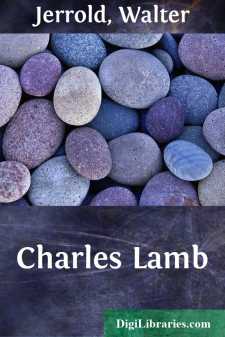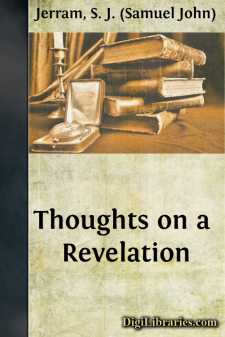Non-Classifiable
- Non-Classifiable 1768
Non-Classifiable Books
Sort by:
by:
Lytton Strachey
CHAPTER I. ANTECEDENTS I On November 6, 1817, died the Princess Charlotte, only child of the Prince Regent, and heir to the crown of England. Her short life had hardly been a happy one. By nature impulsive, capricious, and vehement, she had always longed for liberty; and she had never possessed it. She had been brought up among violent family quarrels, had been early separated from her disreputable and...
more...
INTRODUCTION Although the quilt is one of the most familiar and necessary articles in our households, its story is yet to be told. In spite of its universal use and intimate connection with our lives, its past is a mystery which—at the most—can be only partially unravelled. The quilt has a tradition of long centuries of slow but certain progress. Its story is replete with incidents of love and...
more...
A WOMAN'S PART IN A REVOLUTION I hope I may be able to tell the truth always, and to see it aright according to the eyes which God Almighty gives me.—Thackeray. I. Totsey the terrier lay blinking in the hot African sun, while Cecilia Rhodes, the house kitten, languished in a cigar box wrapped about with twine to represent bars of iron. Above her meek face was a large label marked 'African...
more...
TO JOHN RUSKIN. My dear Mr. Ruskin,—You have given me very great pleasure by allowing me to inscribe this book to you, and for two reasons; for I have two kinds of acknowledgment that I wish to make to you—first, that of an intellectual debtor to a public teacher; secondly, that of a private friend to the kindest of private friends. The tribute I have to offer you is, it is true, a small one; and...
more...
PREFATORY NOTE. The collection of letters and documents which has occasioned the preparation of the present volume, though it has been so long buried in obscurity, appears to have been originally made with a view to publication. It was for many years, and until his decease, in the possession of Mr. Abel Bowen, a well-known engraver and publisher, of Boston, sixty years ago, and was obtained by him from...
more...
by:
U. P. Hedrick
PREFACE Seventy-nine books on grapes enrich the pomology of North America, not counting numerous state and national publications. Pomological writers in America have been partial to the grape, for other fruits do not fare nearly so well. Twenty-two books are devoted to the strawberry, fourteen to the apple, to the peach nine, cranberry eight, plum five, pear nine, quince two, loganberry one, while the...
more...
The Prelude —A Note Explanatory— With James Whitcomb Riley, some years ago. This Man From Down On The Farm, made a Reading Tour, of—in Population—more than one-half of this Imperial Republic, including the Cream of the Canadian Provinces. Of that Tour, at some other time, in some more leisurely hour, he desires, if able, to make a full and faithful Record. This, is but a humble Spray of...
more...
CHAPTER I—HOW MY MOTHER GOT HER SOFT FACE On the day I was born we bought six hair-bottomed chairs, and in our little house it was an event, the first great victory in a woman’s long campaign; how they had been laboured for, the pound-note and the thirty threepenny-bits they cost, what anxiety there was about the purchase, the show they made in possession of the west room, my father’s unnatural...
more...
by:
Walter Jerrold
CHARLES LAMB THE STORY OF HIS LIFE Charles Lamb's biography should be read at length in his essays and his letters—from them we get to know not only the facts of his life but almost insensibly we get a knowledge of the man himself such as cannot be conveyed in any brief summary. He is as a friend, a loved friend, whom it seems almost sacrilegious to summarize in the compact sentences of a...
more...
THOUGHTS ON A REVELATION. Few persons can have observed attentively the various phases of public opinion on religious subjects during the last twenty years or more, without noticing a growing tendency to the accumulation of difficulties on the subject of Revelation. Geology, ethnology, mythical interpretation, critical investigation, and inquiries of other kinds, have raised their several...
more...



